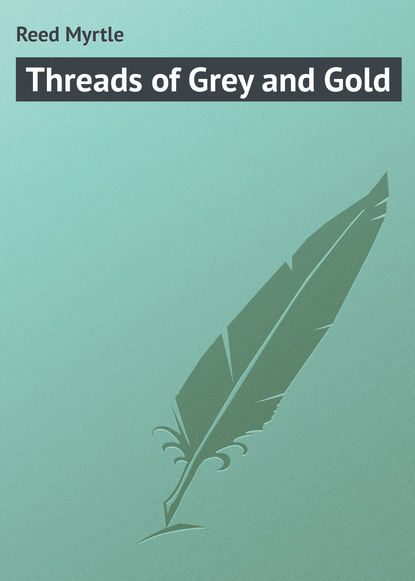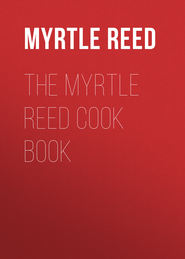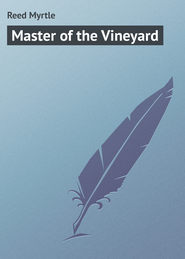По всем вопросам обращайтесь на: info@litportal.ru
(©) 2003-2024.
✖
Threads of Grey and Gold
Настройки чтения
Размер шрифта
Высота строк
Поля
All hail to the New! He is coming with gladness,
From the East, where in light he reposes;
He is bringing a year free from pain and from sadness,
He is bringing a June with her roses.
A burst of sweet music, the listeners hear,
The stars and the angels give warning —
He is coming in beauty, this joyful New Year,
O’er the flower-strewn stairs of the morning.
He is bringing a day with glad pulses beating,
For the sorrow and passion are gone,
And Love and Life have a rapturous meeting
In the rush and the gladness of dawn.
The Old has gone out with a crown that is hoary,
The New in his brightness draws near;
Then let us look up in the light and the glory,
And welcome this royal New Year.
The Courtship of George Washington
The quaint old steel engraving which shows George and Martha Washington sitting by a table, while the Custis children stand dutifully by, is a familiar picture in many households, yet few of us remember that the first Lady of the White House was not always first in the heart of her husband.
The years have brought us, as a people, a growing reverence for him who was in truth the “Father of His Country.” Time has invested him with godlike attributes, yet, none the less, he was a man among men, and the hot blood of youth ran tumultuously in his veins.
At the age of fifteen, like many another schoolboy, Washington fell in love. The man who was destined to be the Commander of the Revolutionary Army, wandered through the shady groves of Mount Vernon composing verses which, from a critical standpoint, were very bad. Scraps of verse were later mingled with notes of surveys, and interspersed with the accounts which that methodical statesman kept from his school-days until the year of his death.
In the archives of the Capitol on a yellowed page, in Washington’s own handwriting, these lines are still to be read:
“Oh, Ye Gods, why should my Poor Resistless Heart
Stand to oppose thy might and Power,
At last surrender to Cupid’s feather’d Dart,
And now lays bleeding every Hour
For her that’s Pityless of my grief and Woes,
And will not on me, pity take.
I’ll sleep amongst my most inveterate Foes,
And with gladness never wish to wake.
In deluding sleepings let my Eyelids close,
That in an enraptured Dream I may
In a soft lulling sleep and gentle repose
Possess those joys denied by Day.”
Among these boyish fragments there is also an incomplete acrostic, evidently intended for Miss Frances Alexander, which reads as follows:
“From your bright sparkling Eyes I was undone;
Rays, you have, rays more transparent than the Sun
Amidst its glory in the rising Day;
None can you equal in your bright array;
Constant in your calm, unspotted Mind;
Equal to all, but will to none Prove kind,
So knowing, seldom one so young you’ll Find.
“Ah, woe’s me that I should Love and conceal —
Long have I wished, but never dare reveal,
Even though severely Love’s Pains I feel;
Xerxes that great wast not free from Cupid’s Dart,
And all the greatest Heroes felt the smart.”
He wrote at length to several of his friends concerning his youthful passions. In the tell-tale pages of the diary, for 1748, there is this draft of a letter:
“Dear Friend Robin: My place of Residence is at present at His Lordship’s where I might, was my heart disengag’d, pass my time very pleasantly, as there’s a very agreeable Young Lady Lives in the same house (Col. George Fairfax’s Wife’s Sister); but as that’s only adding fuel to fire, it makes me the more uneasy, for by often and unavoidably being, in Company with her revives my former Passion for your Lowland Beauty; whereas was I to live more retired from young Women I might in some measure aliviate my sorrows by burying that chaste and troublesome Passion in the grave of oblivion or eternal forgetfulness, for as I am very well assured, that’s the only antidote or remedy, that I shall be relieved by, as I am well convinced, was I ever to ask any question, I should only get a denial which would be adding grief to uneasiness.”
The “Lowland Beauty” was Miss Mary Bland. Tradition does not say whether or not she ever knew of Washington’s admiration, but she married Henry Lee.
“Light Horse Harry,” that daring master of cavalry of Revolutionary fame, was the son of the “Lowland Beauty,” and some tender memories of the mother may have been mingled with Washington’s fondness for the young soldier. It was “Light Horse Harry” also, who said of the Commander-in-Chief that he was “first in war, first in peace, and first in the hearts of his countrymen!”
By another trick of fate the grandson of the “Lowland Beauty” was Gen. Robert E. Lee. Who can say what momentous changes might have been wrought in history had Washington married his first love?
Miss Gary, the sister of Mrs. Fairfax, was the “agreeable young lady” of whom he speaks. After a time her charm seems to have partially mitigated the pain he felt over the loss of her predecessor in his affections. Later he writes of a Miss Betsey Fauntleroy, saying that he is soon to see her, and that he “hopes for a revocation of her former cruel sentence.”
When Braddock’s defeat brought the soldier again to Mount Vernon, to rest from the fatigues of the campaign, there is abundant evidence to prove that he had become a personage in the eyes of women. For instance, Lord Fairfax writes to him, saying:
“If a Satterday Night’s Rest cannot be sufficient to enable your coming hither to-morrow the Lady’s will try to get Horses to equip our Chair or attempt their strength on Foot to Salute you, so desirious are they with loving Speed to have an occular Demonstration of your being the same identical Gent – that lately departed to defend his Country’s Cause.”
A very feminine postscript was attached to this which read as follows:
“Dear Sir
“After thanking Heaven for your safe return, I must accuse you of great unkindness in refusing us the pleasure of seeing you this night. I do assure you nothing but our being satisfied that our company would be disagreeable, should prevent us from trying if our Legs would not carry us to Mount Vernon this night, but if you will not come to us, to-morrow morning very early we shall be at Mount Vernon.
“Sally Fairfax
Ann Spearing
Eliz’th Dent”
Yet, in spite of the attractions of Virginia we find him journeying to Boston, on military business, by way of New York.
The hero of Braddock’s stricken field found every door open before him. He was fêted in Philadelphia, and the aristocrats of Manhattan gave dinners in honour of the strapping young soldier from the wilds of Virginia.
At the house of his friend, Beverly Robinson, he met Miss Mary Philipse, and speedily surrendered. She was a beautiful, cultured woman, twenty-five years old, who had travelled widely and had seen much of the world. He promptly proposed to her, and was refused, but with exquisite grace and tact.
Graver affairs however soon claimed his attention, and he did not go back, though a friend wrote to him that Lieutenant-Colonel Morris was besieging the citadel. She married Morris, and their house in Morristown became Washington’s headquarters, in 1776 – again, how history might have been changed had Mary Philipse married her Virginia lover!
In the spring of 1758, Washington met his fate. He was riding on horseback from Mount Vernon to Williamsburg with important despatches. In crossing a ford of the Pamunkey he fell in with a Mr. Chamberlayne, who lived in the neighbourhood. With true Virginian hospitality he prevailed upon Washington to take dinner at his house, making the arrangement with much difficulty, however, since the soldier was impatient to get to Williamsburg.
A petite hazel-eyed woman – she who was once Patsy Dandridge, but then the widow of Daniel Parke Custis – was delaying important affairs. At night-fall the distracted warrior remembered his mission, and made a hasty adieu. Mr. Chamberlayne, meeting him at the door, laid a restraining hand upon his arm. “No guest ever leaves my house after sunset,” he said.
The horse was put up, the servant released from duty, and Washington remained until the next morning, when, with new happiness in his heart, he dashed on to Williamsburg.
We may well fancy that her image was before him all the way. She had worn a gown of white dimity, with a cluster of Mayblossoms at her belt, and a little white widow’s cap half covered her soft brown hair.
From the East, where in light he reposes;
He is bringing a year free from pain and from sadness,
He is bringing a June with her roses.
A burst of sweet music, the listeners hear,
The stars and the angels give warning —
He is coming in beauty, this joyful New Year,
O’er the flower-strewn stairs of the morning.
He is bringing a day with glad pulses beating,
For the sorrow and passion are gone,
And Love and Life have a rapturous meeting
In the rush and the gladness of dawn.
The Old has gone out with a crown that is hoary,
The New in his brightness draws near;
Then let us look up in the light and the glory,
And welcome this royal New Year.
The Courtship of George Washington
The quaint old steel engraving which shows George and Martha Washington sitting by a table, while the Custis children stand dutifully by, is a familiar picture in many households, yet few of us remember that the first Lady of the White House was not always first in the heart of her husband.
The years have brought us, as a people, a growing reverence for him who was in truth the “Father of His Country.” Time has invested him with godlike attributes, yet, none the less, he was a man among men, and the hot blood of youth ran tumultuously in his veins.
At the age of fifteen, like many another schoolboy, Washington fell in love. The man who was destined to be the Commander of the Revolutionary Army, wandered through the shady groves of Mount Vernon composing verses which, from a critical standpoint, were very bad. Scraps of verse were later mingled with notes of surveys, and interspersed with the accounts which that methodical statesman kept from his school-days until the year of his death.
In the archives of the Capitol on a yellowed page, in Washington’s own handwriting, these lines are still to be read:
“Oh, Ye Gods, why should my Poor Resistless Heart
Stand to oppose thy might and Power,
At last surrender to Cupid’s feather’d Dart,
And now lays bleeding every Hour
For her that’s Pityless of my grief and Woes,
And will not on me, pity take.
I’ll sleep amongst my most inveterate Foes,
And with gladness never wish to wake.
In deluding sleepings let my Eyelids close,
That in an enraptured Dream I may
In a soft lulling sleep and gentle repose
Possess those joys denied by Day.”
Among these boyish fragments there is also an incomplete acrostic, evidently intended for Miss Frances Alexander, which reads as follows:
“From your bright sparkling Eyes I was undone;
Rays, you have, rays more transparent than the Sun
Amidst its glory in the rising Day;
None can you equal in your bright array;
Constant in your calm, unspotted Mind;
Equal to all, but will to none Prove kind,
So knowing, seldom one so young you’ll Find.
“Ah, woe’s me that I should Love and conceal —
Long have I wished, but never dare reveal,
Even though severely Love’s Pains I feel;
Xerxes that great wast not free from Cupid’s Dart,
And all the greatest Heroes felt the smart.”
He wrote at length to several of his friends concerning his youthful passions. In the tell-tale pages of the diary, for 1748, there is this draft of a letter:
“Dear Friend Robin: My place of Residence is at present at His Lordship’s where I might, was my heart disengag’d, pass my time very pleasantly, as there’s a very agreeable Young Lady Lives in the same house (Col. George Fairfax’s Wife’s Sister); but as that’s only adding fuel to fire, it makes me the more uneasy, for by often and unavoidably being, in Company with her revives my former Passion for your Lowland Beauty; whereas was I to live more retired from young Women I might in some measure aliviate my sorrows by burying that chaste and troublesome Passion in the grave of oblivion or eternal forgetfulness, for as I am very well assured, that’s the only antidote or remedy, that I shall be relieved by, as I am well convinced, was I ever to ask any question, I should only get a denial which would be adding grief to uneasiness.”
The “Lowland Beauty” was Miss Mary Bland. Tradition does not say whether or not she ever knew of Washington’s admiration, but she married Henry Lee.
“Light Horse Harry,” that daring master of cavalry of Revolutionary fame, was the son of the “Lowland Beauty,” and some tender memories of the mother may have been mingled with Washington’s fondness for the young soldier. It was “Light Horse Harry” also, who said of the Commander-in-Chief that he was “first in war, first in peace, and first in the hearts of his countrymen!”
By another trick of fate the grandson of the “Lowland Beauty” was Gen. Robert E. Lee. Who can say what momentous changes might have been wrought in history had Washington married his first love?
Miss Gary, the sister of Mrs. Fairfax, was the “agreeable young lady” of whom he speaks. After a time her charm seems to have partially mitigated the pain he felt over the loss of her predecessor in his affections. Later he writes of a Miss Betsey Fauntleroy, saying that he is soon to see her, and that he “hopes for a revocation of her former cruel sentence.”
When Braddock’s defeat brought the soldier again to Mount Vernon, to rest from the fatigues of the campaign, there is abundant evidence to prove that he had become a personage in the eyes of women. For instance, Lord Fairfax writes to him, saying:
“If a Satterday Night’s Rest cannot be sufficient to enable your coming hither to-morrow the Lady’s will try to get Horses to equip our Chair or attempt their strength on Foot to Salute you, so desirious are they with loving Speed to have an occular Demonstration of your being the same identical Gent – that lately departed to defend his Country’s Cause.”
A very feminine postscript was attached to this which read as follows:
“Dear Sir
“After thanking Heaven for your safe return, I must accuse you of great unkindness in refusing us the pleasure of seeing you this night. I do assure you nothing but our being satisfied that our company would be disagreeable, should prevent us from trying if our Legs would not carry us to Mount Vernon this night, but if you will not come to us, to-morrow morning very early we shall be at Mount Vernon.
“Sally Fairfax
Ann Spearing
Eliz’th Dent”
Yet, in spite of the attractions of Virginia we find him journeying to Boston, on military business, by way of New York.
The hero of Braddock’s stricken field found every door open before him. He was fêted in Philadelphia, and the aristocrats of Manhattan gave dinners in honour of the strapping young soldier from the wilds of Virginia.
At the house of his friend, Beverly Robinson, he met Miss Mary Philipse, and speedily surrendered. She was a beautiful, cultured woman, twenty-five years old, who had travelled widely and had seen much of the world. He promptly proposed to her, and was refused, but with exquisite grace and tact.
Graver affairs however soon claimed his attention, and he did not go back, though a friend wrote to him that Lieutenant-Colonel Morris was besieging the citadel. She married Morris, and their house in Morristown became Washington’s headquarters, in 1776 – again, how history might have been changed had Mary Philipse married her Virginia lover!
In the spring of 1758, Washington met his fate. He was riding on horseback from Mount Vernon to Williamsburg with important despatches. In crossing a ford of the Pamunkey he fell in with a Mr. Chamberlayne, who lived in the neighbourhood. With true Virginian hospitality he prevailed upon Washington to take dinner at his house, making the arrangement with much difficulty, however, since the soldier was impatient to get to Williamsburg.
A petite hazel-eyed woman – she who was once Patsy Dandridge, but then the widow of Daniel Parke Custis – was delaying important affairs. At night-fall the distracted warrior remembered his mission, and made a hasty adieu. Mr. Chamberlayne, meeting him at the door, laid a restraining hand upon his arm. “No guest ever leaves my house after sunset,” he said.
The horse was put up, the servant released from duty, and Washington remained until the next morning, when, with new happiness in his heart, he dashed on to Williamsburg.
We may well fancy that her image was before him all the way. She had worn a gown of white dimity, with a cluster of Mayblossoms at her belt, and a little white widow’s cap half covered her soft brown hair.











